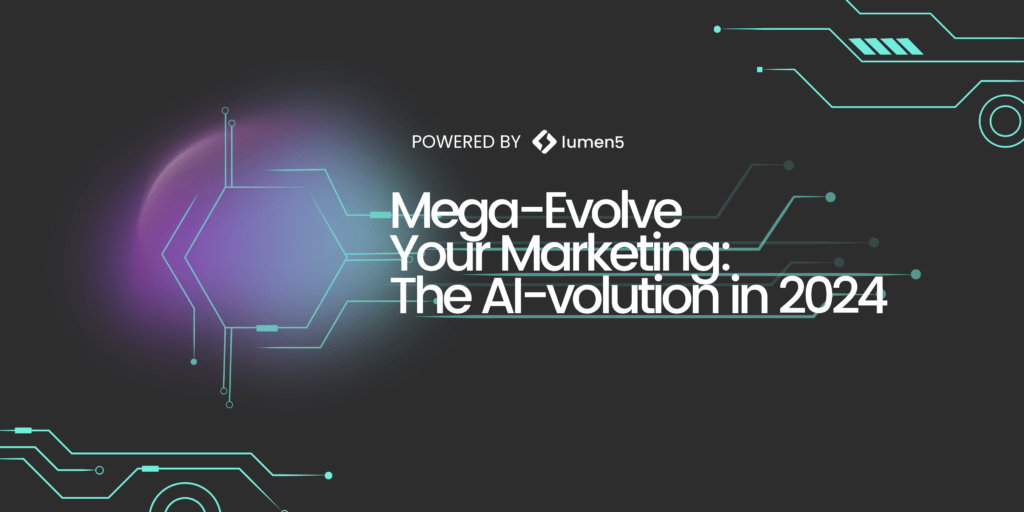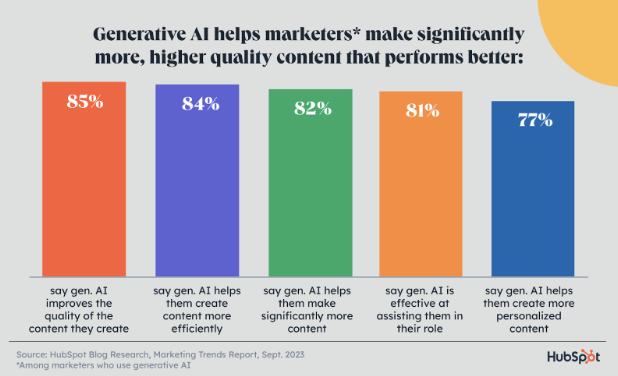
The more advances there are in AI technology, the more people are starting to feel like they are living in an episode of Black Mirror.
AI’s capabilities have completely transformed how we approach our marketing strategies. It’s never been easier to engage your audience in such a consistent, personalized way. However, a lot of marketers haven’t quite passed the finish line to go all-in on the AI takeover. Navigating the responsibilities and ethical use of AI can be a head scratcher, but it’s crucial to keep these considerations top-of-mind in the context of marketing.
As we harness these powerful technologies, the ethical implications of AI in marketing becomes a critical conversation we ought to be having. Responsible AI means being held accountable for the way you use AI tools while mindfully respecting human values and rights. We really DON’T want to be in a Black Mirror episode (… any more than we already are).
Long story short, embracing smart AI practices will allow you to foster transparency and accountability in your marketing strategies and output. Let’s break it down.
The Role of AI in Marketing
You might be wondering, if the risk is so high, why bother using AI technologies in the first place? Well, AI in marketing has proved to be incredibly useful. In the last year, there’s no denying that it’s going anywhere. Moreover, 98% of business leaders agree that companies need to better understand the potential of AI and machine learning technology for long-term success.
One of the strongest selling points for AI in marketing is the amount of time and energy you can save while increasing the amount of valuable content you can put out. AI-powered assistants are able to do things like generate content ideas, gather research catered to your niche, and help organize your social media accounts. Generative AI also offers an unprecedented amount of ways content can be produced, bringing ideas to life like never before, allowing you to create good content in minutes versus hours. As of late, AI in marketing has an impressive resume and offers an undeniable advantage for marketers to really cater to their audience.
The Different Systems for Ethical AI Use
We’re only human. As a wise uncle once said (or aunt, we see you MCU 🫡), with great power comes great responsibility. So while we leverage these AI technologies to our advantage, we must hold ourselves accountable, be transparent, steer clear of biases, and carefully handle the data we are granted.
Data Privacy
Nowadays, when you download a new app on your phone, the immediate question is “hey, are we allowed to track your activity?” In an age where consumer data is gold, respecting privacy is paramount. Ethical marketing practices demand stringent data governance, ensuring that customer information is collected, stored, and used transparently and securely.
Consent and Transparency
Transparency builds trust, which is crucial to developing a strong relationship with your customers. Good communication is the key to any good relationship, and that includes the one with your audience. Don’t leave room for any doubts and empower your audience to make informed decisions. We like how it feels when our favourite brands pay attention and cater to our needs, but it’s even better when you can see it coming.
“Transparency is not just a buzzword; it is the foundation of building trust with our customers in the era of AI-powered marketing,” says Michael Roberts, CMO of MetLife. “Recent global research among our customers indicated that 77% are more likely to trust companies that have policies on how to use AI ethically.”
Michael Roberts, CMO of MetLife | Source: Forbes
Bias and Fairness
AI systems adopt the same biases as the people who train them. It can be extremely jarring to notice blatant discrimination or exclusion (check out Bloomberg’s report: Humans Are Biased, Generative AI is Even Worse). As marketers, it’s our job to actively work to eliminate biases in AI algorithms to ensure fairness and inclusivity in marketing practices, and being aware of this problem is the first step to ensuring it’s not apparent in your work.

Responsible AI Tactics for Marketers
It’s not enough to just be aware of the ethical concerns in AI and marketing. You have to actively enforce these protocols into your usage and stay aware of the necessary procedures.
Data Governance
These are the Big 4: Fairness, Accountability, Transparency and Privacy. Develop and enforce robust data management policies that prioritize those concerns, ensuring that consumer data is handled with the utmost care and respect.
Ethical AI Development
Embed ethical considerations into the AI development process, from design to deployment, to create systems that are not only effective but also fair and equitable. For example, ensure that the data used to train AI models is representative of diverse demographics to prevent biases.🙅♀️ And don’t stop there, regularly evaluate and update your data sets to maintain fairness and accuracy!
Continuous Monitoring and Collaboration
Keep up with that human-first (and human-last?) approach. Regularly review AI systems for ethical compliance and performance to adapt to changing regulations. Don’t share anything without approval from a real set of eyes. 👀 Engage with industry groups and regulatory bodies to stay updated on best practices and emerging ethical considerations in AI. Collaboration can also help in benchmarking and improving ethical AI practices.
Why AI Ethics Matter in Marketing
We don’t actually want robots to take over the world. Despite the AI boom, people now more than ever want to actually connect with other people. Authenticity accounts for a lot more than you think, which is why AI ethics works to your advantage.
⭐ Trust and Brand Reputation: Ethical AI practices can significantly enhance consumer trust and loyalty, which strengthens your brand and encourages a long-term relationship with your customers.
⭐ Regulatory Compliance: With increasing legal scrutiny around AI and data privacy, ethical marketing practices are not optional but a necessity to avoid legal repercussions.
⭐ Social Responsibility: Marketers play a key role in shaping societal norms and values. Upholding the values that are not only personal to you but your company as a whole is important to your brand’s image. Ethical AI practices ensure that this influence promotes diversity, fairness, and inclusivity.
So, how to get started?
- Educate your team on the importance of AI ethics
- Incorporate ethical checkpoints at each stage of the AI development and deployment process
- Look to industry leaders and case studies for inspiration and guidance on ethical AI practices
Let’s continue to leverage this technology while also valuing our humanity and creativity. By committing to responsible AI practices, marketers can lead the charge towards a more ethical, transparent, and inclusive digital future.
The AI-volution is here!
More questions or interested in more conversations about AI and marketing in 2024? Check out our webinar!

Our webinar focuses on the future of AI for businesses. The AI-volution in 2024 will discuss key takeaways and exclusive POVs from AI experts about how they’ve built and implemented AI-based companies from the ground up. Discover the latest trends, practical insights, and expert perspectives that will empower the way you approach marketing and empower you to supercharge your marketing in 2024 and beyond.
Everything video, AI and marketing. All in one place.
Want to incorporate AI into your workflow? We’ve got you covered. With our tips and tricks, elevate your content game and strategy to win over leads.
Sign up and join 1000+ other marketers:







